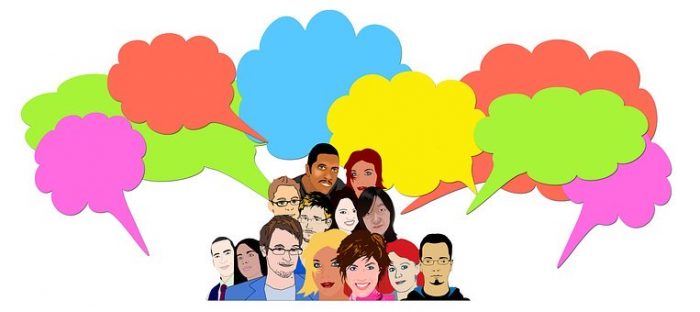(Note: In this piece on language, I use the terms L1 to refer to our native tongue and L2 to refer to a second—or beyond—language.)
Hello! Bonjour! Jambo! Ciao! Namaste! Guten Tag! Hyvää huomenta!
People everywhere light up with a smile when receiving a greeting—especially, in their native tongue. The ice is broken; we’re no longer complete strangers. Perhaps we’ll get an invitation to have a cup of tea or to peruse the wares. Or, who knows, it might be the beginning of a friendship.
No doubt, reaching out beyond our mother tongue expands our world view, even if it’s just a toe over the border.
It simply feels good to connect. Solidarity. Inclusivity.
Learning a new language is not easy. Nevertheless, there is so much value in pursuing a new language.
“A different language is a different vision of life.” – Federico Fellini
I had an unusual upbringing in that my family moved from country to country. I was exposed to a number of languages and cultures and attended international schools. It was an extraordinary way to learn about the world and to hone my sensitivity to cultural nuances and develop an ear for language.
It’s no wonder I gravitated to a career dealing with language learning and international students.
For some twenty years, I taught English as a Second Language (ESL) primarily in American higher education programs but also abroad. My students came from all corners of the globe: Mongolia, India, Brazil, Germany, Saudi Arabia, Qatar, Vietnam, Thailand. (Just sneaking in an aside: teaching ESL can be a fabulous way to experience the world.)
I respected my students for taking the big leap to move to a new country and take on intensive study of a new language in quest of education and a passport to global citizenry. It’s not easy to move your life to a new country and learn a new language—and write academic papers and emails in a new language.
Those of us who are native English speakers do have a certain luck in that English has become the world’s lingua franca. Indeed, we can go blithely along in our lives without having to learn a word of another language. Other than for stylistic effect, or the many loan words that have become integrated with the English lexicon, e.g. caveat emptor, faux-pas, prima donna, schadenfreude, aficionado, avatar.
Poet Gary Snyder observes: English is a rich midden-heap of semi-composted vocabularies — a genuine creolized tongue that lucked out in becoming the second language to the world.
Why bother to learn another language?
Ah, I hear the clamor now: I’m no good at languages! It’s too hard! I hate grammar! Yet we admire people who speak multiple languages. And we know the cliché about it opening windows on the world. It’s true. All it takes is … sforzo. (Italian, noun: effort, work, exertion, concentration.)
And language! /ˈlæŋgwɪdʒ/ El idioma. Das sprache. And Russian’s Cyrillic alphabet: Язык /jazýk/
How exhilarating it is to crack the code. To make meaning in new ways. To connect with people beyond your immediate culture, to communicate more expansively. To be polyglottal.
And what a wonderful thing to be genuinely curious about. The blah blah blah. The gift of gab. The Tower of Babel. Language—one of the key traits that sets our human species apart.
So many have the notion that it’s difficult. True, it is. But probably not as torturous as you think. After all, each of us has quite masterfully learned our first language. (Ah, if we could only get ourselves back into the open mindset of a child. So keenly observant, so resilient. A sponge for information. Oh, to be able to process that way again.)
Unfortunately, most of us quite likely yawned our way through our Spanish or French or Russian classes. Probably we didn’t have a very inspiring foreign language teacher in school. (And for those of us who did, hooray for that teacher.)
Some reasons why it’s worth the effort to learn an L2—and yes, some of these are obvious:
- Helps us to connect with people of the world. Even a few words—and they need not be perfectly pronounced or grammatically correct.
- It’s good for your brain. Nutrition for the ol’ grey matter. It can improve memory and ward off Alzheimer’s disease. It’s exercise for the listening ‘muscle’. And for the mouth muscles. That tricky French “R” sound. In Paris you ask where is the Rue des Trois Frères. Oh là là! And how about those contented French felines with their ronronner. An onomatopoeic word, it actually emulates a purr.
- To learn to pronounce foreign words, you kind of have to exaggerate the sounds. Indeed, part of learning another language is letting yourself be goofy. Talk to your dog. Fido don’t care ‘bout grammar or pronunciation. Explore with your cat ways to say “meow” in other languages. (It’s a surprisingly easy language. LOL.)
- It can open up career opportunities. Here in the U.S., being a Spanish speaker will often gain you resumé cred. Being bilingual can earn you money.
- We become more confident and expressive in our native language. By studying language and paying closer attention to how it works, we hone our overall facility with language.
- Reading novels and poems in their original language is more gratifying. No translation is quite as good as the original. Le Petit Prince is just a bit more exquisite of a read than The Little Prince.
I admit, when it comes to languages, my bias is inclined toward Italian. And not just because one side of my family hails from that country. But the Italian language—simply bellissimo! Those delightful consonant clusters and open vowels! The /sb/ and the /gl/ of sbagliare (to make a mistake)! To sink your teeth into a decadent zabaglione. (Widen and flatten the tongue on the top of the palate to make that /gl/.) And the /gn/ sound—it seems straight out of Monty Python. The knights who go “gn”—no wait, that was actually “ni.” Gnocchi—such a delicious dish! Try it with slightly burnt butter over top—yum!
How to do it—that is, get your L2 on:
- Take a traditional class with a real, live teacher. Provided the teacher is competent and passionate and students are fully engaged, this can be the best way. Short of living in a country and being fully immersed in the language.
- There are numerous apps and online forums that can be very useful in learning a second language. The self-paced aspect of an online course can be appealing. Some, of course, are better than others. Do the research; read reviews. But yeah, no method will work unless you stick with it. Just as nothing will stick unless you work it. Truth.
- Join a conversation group. University language departments often have an open one. Call and find out.
- Find a book that’s geared toward beginners—or whatever level you’re at. Many kids’ books are great. Check with your friendly local librarian. Do an online search. Reading in an L2 will never, of course, be as easy as in your native tongue. But as you expand your L2 vocabulary and familiarity with the syntax, it gets easier.
- Watch movies. Having subtitles—either in the L1 or the L2—will certainly make this easier.
- Spend time in a country. Volunteer. Live with a family.
- Let yourself be imaginative and inventive. When stumped for a word, try describing it using other words and get your body language on—facial expressions—and those hands-fabulous-hands, not just for Italians! An aspect of being a good L2 learner is not taking ourselves too seriously. Let yourself be goofy.
Undoubtedly, the surest way to learn another language is at a young age (the critical period, when our brains have a great deal of plasticity). But adults, don’t give up!
In all seriousness, learning a foreign language—once in the land beyond childhood—is not an easy undertaking. But neither is becoming a musician or obtaining a PhD. Would that we could just tuck a grammar book under our pillow and wake up speaking fluent Mandarin. Alas. ¡Ai, qué lástima! It’s going to take some dedication, some sforzo.
And once you get going with a new language, work it baby. Like any other skill, it’s a matter of use it or lose it. Of course, ya gotta want it, want it. Like anything else.
Meanwhile—
Mangia bene, ridi spesso, ama molto. (Eat well, laugh often, love a lot.)
Some fun books to check out:
- The Little Book of Language – David Crystal
- The Mother Tongue: English and How it Got that Way – Bill Bryson






Read 3 comments and reply